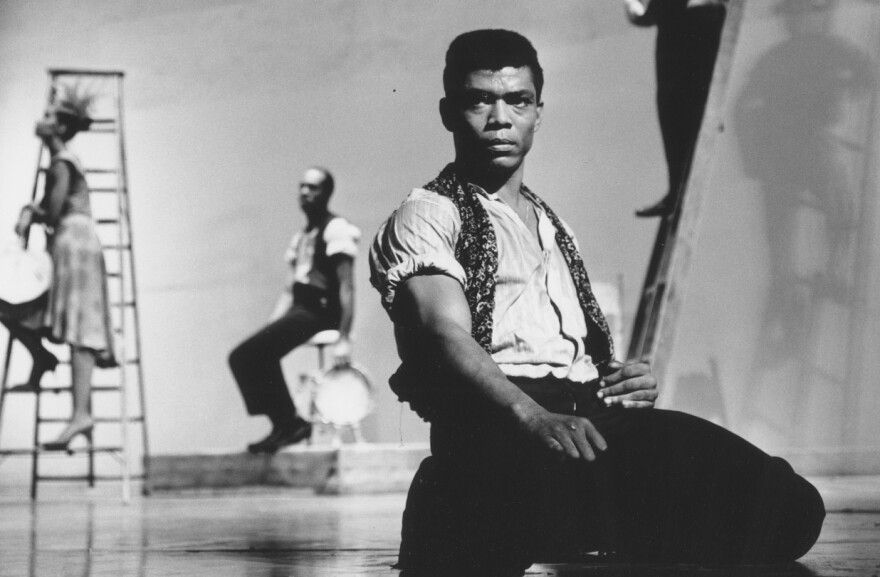The first time Allan Gray met the world famous choreographer Alvin Ailey was in 1982, when Ailey was in Kansas City to perform at the Folly Theater. It was Gray’s job, as leader of a group selling tickets to the show, to take care of him while he was in town.
“I, in fact, had not heard of Alvin, prior to learning that they were coming to Kansas City, so I was quite excited to meet this man who was, from all accounts, a genius,” Gray said. “And so we met at the airport, and had an immediate connection that lasted.”
Beginning in the 1950s, and continuing until his death in 1989, Ailey transformed American dance and used his deeply personal art to advance the cause of civil rights.
Thanks to the relationship Gray and Ailey nurtured, Kansas City has some claim to Ailey's legacy, the nonprofit Kansas City Friends of Alvin Ailey, which serves as the second home of the renowned Alvin Ailey American Dance Theater.
Gray and about 30 other Ailey fans gathered Thursday afternoon at the Black Archives of Mid-America, prior to making their way to the local premier of the documentary, “Ailey.”
The film is directed by award-winning director Jamila Wignot, who, like Ailey in his time, made her way from New York to share her work with eager audiences in Kansas City, even for just one weekend.
“Kansas City and New York were the two,” she told the crowd. “If y’all liked it, I did a good job.”
The new documentary’s local premier sold out more than a week in advance, but the AMC theater at Ward Parkway Center has additional showings throughout the week. If enough people purchase tickets this week, the run could be extended.
“Kansas City welcomed Alvin for who he was,” said Gray. “We were more concerned or more focused on who he was as an individual, and that brought about the connection.”
The Kansas City connection
The Harriman-Jewell Series first brought Ailey to Kansas City in 1968, but Ailey was born in a small town in segregated central Texas in 1931.
At the age of 12 he moved to Los Angeles, and was introduced to dance by performances of the Ballet Russe de Monte Carlo and the Katherine Dunham Dance Company, according to his American Dance Theater biography.
In 1958, he founded the Alvin Ailey American Dance Theater in New York City, “to carry out his vision of a company dedicated to enriching the American modern dance heritage and preserving the uniqueness of the African American cultural experience,” the website says.
According to Melanie Miller, CEO of KCFAA, the dancer and choreographer always had a fondness for Kansas City, “in part, because of our love for jazz.”
He would go on to dedicate some of his work to famous Kansas City musicians, including “For ‘Bird’ — With Love,” for saxophonist Charlie Parker, and “Opus McShann,” for pianist Jay McShann.

When Ailey began considering a second home for his dance company, civic leaders and arts organizations here urged him to consider Kansas City, and KCFAA was created in 1984.
Ailey died of AIDS in 1989, though it wasn’t revealed until later. The New York Times reported at the time that he suffered from "terminal blood dyscrasia, a rare disorder that affects the bone marrow and red blood cells."
Upon his death, Ailey entrusted his personal papers to Gray, a collection that is now at the Black Archives of Mid-America in Kansas City.
“There's a lot of pride that Alvin selected Kansas City to be the only second home to the Alvin Ailey American Dance Theater,” Miller said.
KCFAA presents Alvin Ailey American Dance Theater in annual performances in Kansas City theaters, and, as a community arts educator, they help teach critical life skills through dance.
Since 1989, the organization has hosted AileyCamp, which was designed to reach urban youth, using dance to develop self-esteem, discipline, critical thinking skills and creativity.
“We also do classes on personal development where we talk about suicide, we talk about drugs, we talk about sexual responsibility, we talk about conflict management. We talk about issues that affect middle schoolers,” Miller said. “It is a transformational camp.”
Identity and race
Ailey did not discuss his thoughts on racism or other political issues overtly. Commentators noted throughout his career, though, that they seem to have found their way into his art.
Wignot, the documentary director, recalls the first time she saw Ailey’s company perform.
“There was an immediacy to it, there was beauty, and there was drama,” Wignot said. “It is a multi-racial company, but to see this kind of body of people doing these works just really floored me."
For Miller, the film will provide a good opportunity to hear Ailey tell his own story.
“Alvin Ailey was a very private person and everything that I've read about him, he was a quiet force,” she said. “I cannot wait to see the movie and be able to actually hear him speak.”
The film, and the inner monologue it reveals, came about because of a series of audio recordings Ailey made during the last year of his life. While he prepared to write an autobiography, Ailey’s health was getting worse.
“Thinking about the memories that mattered most to him and the kind of things that he wanted to share in the last year of his life … that became the foundation for us,” the film’s director said at an event last month in New York.
Another reason Melanie Miller thinks the film might resonate now is because many of the challenges Alvin Ailey dealt with in the '50s still ring true.
“He didn't really care about the color of your skin, he cared about the talent, the quality of the work that you did,” she said. “That's something that we need to continue to focus on, to create a seat at the table for everyone.”






